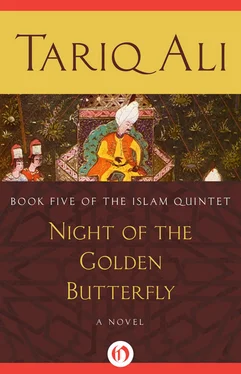‘Is it true that you call him Confucius?’
The whole table erupted in laughter. It was only as we were all leaving and farewells were being said that she walked up to me.
‘It was really nice talking to you.’
‘But you didn’t.’
‘I know.’
Since my house was not too far from F.C. College, Zahid gave both me and Tipu a lift, dropping Tipu off first so the two of us could have a calm post-mortem. We stopped the car on the unfinished road outside my house. It was a wilderness then, with the only the mausoleum of a Sufi venerable lit in the distance with oil lamps.
I had liked Tipu instinctively and was determined that he should join our cell even if it meant biking six miles to where we were. He was obviously bright, and better read than all of us. Zahid disagreed and thought it would be better if Tipu were recruited to his local cell. But I wanted to keep an eye on him, in case Jindié really did want him and not me. I explained this to Zahid, who wasn’t surprised in the least.
‘I noticed your gaze’, said Zahid, ‘and so did she.’
‘Are you sure she did?’
‘How could she not, catamite? You were staring at her quite obviously. Everyone noticed. That’s why she ignored you the whole evening.’
There was little else to discuss, but we did so anyway for almost two hours. Then I went home and searched my father’s study for translations of Chinese literature and history. The shelves were packed with Europe and South Asia. Chinese civilization was represented by political and history books written by Americans and Europeans, and a few translations of Mao Zedong and Liu Shaoxi. There was a Foreign Languages Publishing House translation of Dream of the Red Chamber , but it was unreadable. Deeply frustrated, I went to bed.
Almost everything lost its importance for me except the memory of Jindié. In the two weeks before the colleges shut down I made desperate efforts to catch sight of her. Zahid had his own problems on this front, trying to see Anjum, the general’s daughter, but was as helpful as he could be, waiting with me outside Nairn to discover how Jindié went home. Many young women biked in those days, and I was hoping she was one of them, but we never saw her leave. I pestered one of the cousins I thought I could trust. She told the others and they would come to stare and giggle at Zahid and me, trying to shame us into leaving. But we had no self-esteem in these matters, and so forfeiting our dignity never posed a problem.
After an hour outside Nairn, we would move on to Gulberg, where the object of Zahid’s love went to a ladies’ college modelled on European finishing schools, where ‘home and social sciences’ were so mixed up that cooking counted as a home subject and interior decoration as a social science. Gulberg trained young women to be housewives. Vogue was the sacred magazine of this establishment, devoured eagerly by teacher and pupil. Zahid swore that Anjum was not empty-headed but had been forced to go there by her parents in order to prepare for marriage.
Zahid wanted the general’s daughter and she wanted him. Letters had been exchanged. They met for coffee in a tiny place run by a kindly old German lady and geared for trysts. It worked like this: Anjum and a girlfriend would be dropped off by the chauffeur; they would get a table. Zahid and I would arrive on his Vespa; we’d get another table. If we recognized anybody, we would maintain the pretence that we were there casually, and move off quickly, but this was rare. I had to entertain Anjum’s friend, who was very pretty and very stupid. She would giggle at the slightest provocation, and I got so fed up that I tried to teach her chess so we didn’t have to speak to each other. She was flattered and learned the moves, which enhanced her status at the finishing school: ‘My, my, you’ve become such an intellectual.’
Occasionally, vile scoundrels on a motorbike followed the girls and blackmailed them for petty cash, but this stopped when the German lady informed her husband, who turned out to be a senior police officer and put a cop on guard duty in that street. He was merely protecting his wife’s business interests, but the gesture was greatly appreciated by her customers.
Mercifully, all this came to an end when Anjum gently broke the news that she was to be engaged to an affected English-public-school-educated feudal idiot from Multan. Zahid’s features assumed a deathly pallor as he rose from her table and staggered over to mine. Speech eluded him for a moment and then in a choked voice he said, ‘Let’s go. Now.’
We left. The soul had been torn out of him. Too many hours were wasted discussing the rejection. The day after, he told me quite seriously that he was having great difficulty in resisting the temptation to blow out his brains. A week later, he was calmer and more reflective.
‘She had such a gentle nature, yaar ,’ he would repeat time and time again.
Perhaps that was the problem, I suggested. Her ‘gentle nature’ prevented her resisting parental pressures as others, we both knew, had done. His heart was sickened by the ease with which her parents had triumphed. I felt a sense of relief. No more playing chess with an aspiring fashion model. I can’t remember her name, but she was modelling two outfits, ‘Naughty Nymph’ and ‘Hello, Officer’, in the Intercontinental in Rawalpindi when the student insurrection against the military began in 1968. As for my friend, he took to wandering about town, full of emotions but avoiding every location that reminded him of her: It seemed as if the entire city had become a sea of bitterness for him. The memory of Anjum haunted him for a long time. The worst possible passion is the passion for a woman one has never possessed. He recovered slowly.
‘There are other sorrows in the world, Zahid,’ I said comfortingly, paraphrasing the words of a much-loved poet, then in prison for the third time.
‘No, there aren’t.’
This should have alerted me. I should have realized that political commitment of any sort was nothing more than a social obligation for him, but it’s easy to say this with hindsight. At the time we all thought of ourselves and of university students in general as the backbone of the country. Its future depended on us, but in the words of the real Confucius, ‘To lead into battle a people that has not first been instructed is to betray them.’ Zahid insisted that the facts proved otherwise and would counter this with the examples of the French and Russian revolutions. He often inclined to more radical solutions than I did and sometimes mocked my caution. Friendship, too, has its illusions, just as strong as those of love.
Three days before we were due to leave for the mountains, our Confucius dropped by for lunch. My mother liked him because he had a pleasing face, was ultra-polite and always made a point of praising the decor of the house and, even more importantly, admiring her rose garden, which was usually ignored by visitors and by us. My father was impressed by his strong support for the Chinese Revolution, not common then in émigré circles. I felt closer to him for obvious reasons. Nevertheless the conversation seemed excessively stilted till my parents left for their siesta. It was late June. The temperature had reached 108 degrees Fahrenheit and the tar on the roads was beginning to melt. I was racking my brains to find a way of asking after Jindié without appearing too eager, but discretion prevailed. He was her brother, after all, and might be offended by an informal display of interest. Then, just before he left, Confucius, trying to sound as casual as possible, said, ‘By the way, we might see you in Nathiagali. My mother is desperate to avoid the heat this year, and we’ve booked a cottage in Pines Hotel for a month.’
Читать дальше












